Rye Barcott's Blog, page 6
July 22, 2020
CFK Healthcare Staff Featured as Frontline Heroes
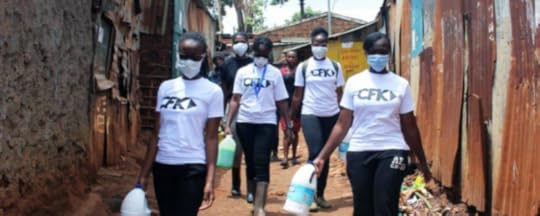
While the COVID-19 pandemic continues to create new healthcare challenges while exacerbating existing ones, our staff are on the frontlines continuing to provide quality healthcare and support the Kibera community. While they and healthcare workers around the world are dedicating their lives to the support of others during this difficult time, it is critical that we recognize and thank them for their hard work. Since the start of the pandemic, we have seen parades, moments of silence, and entire cities coming together to celebrate their healthcare workers from home, and we have heard stories from frontline responders that have inspired us and given us hope.
Thanks to the Bill & Melinda Gates Foundation, in partnership with Save the Children, Malaria No More, and Global Citizen, we have a new way to support and celebrate our healthcare workers. Many of our staff members were recently featured as “Frontline Heroes,” as part of an inspiring initiative that features firsthand video accounts from healthcare workers on the frontline of the COVID-19 pandemic.
Click here to share messages of support for Frontline Heroes and learn more about their experiences, the challenges they are facing, and, most importantly, what keeps them going.
Learn more about how you can support our COVID-19 response.
Stories of Progress
 CFK Healthcare Staff Featured as Frontline Heroesby Hannah Bain|22 July 202022 July 2020
CFK Healthcare Staff Featured as Frontline Heroesby Hannah Bain|22 July 202022 July 2020
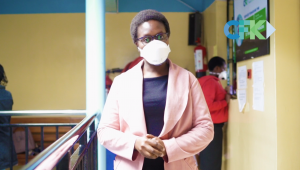 Improving Healthcare: The Story of Eddah Ogogoby Hannah Bain|16 July 202017 July 2020
Improving Healthcare: The Story of Eddah Ogogoby Hannah Bain|16 July 202017 July 2020
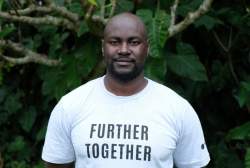 Transforming Education: The Story of Jeffrey Okoroby Hannah Bain|16 July 202016 July 2020
Transforming Education: The Story of Jeffrey Okoroby Hannah Bain|16 July 202016 July 2020The post CFK Healthcare Staff Featured as Frontline Heroes appeared first on Carolina for Kibera.
July 17, 2020
COVID-19 Response: Healthcare Facilities
The coronavirus is a serious public health emergency, but it is not the only primary health challenge facing Kibera. At CFK, we are taking action to mitigate the COVID-19 pandemic in Kibera while continuing to maintain critical healthcare services. Our Tabitha Medical Clinic remains open, but we have limited patient numbers, implemented a mask policy, and set aside an isolation room for potential coronavirus cases. We have also provided our staff with robust training and essential personal protective equipment (PPE).
Learn more from Primary Healthcare Coordinator, Eddah Ogogo, about how we have adapted our primary healthcare programs and operations.
Learn more about our COVID-19 Response
Stories of Progress
 COVID-19 Response: Healthcare Facilitiesby Hannah Bain|17 July 202017 July 2020
COVID-19 Response: Healthcare Facilitiesby Hannah Bain|17 July 202017 July 2020
 COVID-19 Response: Girls Empowermentby Hannah Bain|17 July 202017 July 2020
COVID-19 Response: Girls Empowermentby Hannah Bain|17 July 202017 July 2020
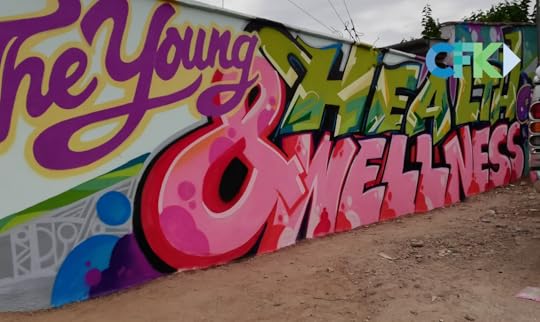 COVID-19 Response: Youth Education & Livelihoodsby Hannah Bain|17 July 202017 July 2020
COVID-19 Response: Youth Education & Livelihoodsby Hannah Bain|17 July 202017 July 2020The post COVID-19 Response: Healthcare Facilities appeared first on Carolina for Kibera.
COVID-19 Response: Girls Empowerment
Emergencies such as the COVID-19 pandemic compound existing inequalities, and women and girls often suffer the most. During this difficult time, CFK is committed to continuing its support of women and girls in Kibera. We are carrying out our mentorship program over the phone and through WhatsApp group messages, delivering sanitary napkins and food, and continuing to provide essential sexual and reproductive health services.
Learn more from our Impact Manager, Ann Kungu, about how we are continuing to empower girls during this difficult time.
Learn more about our COVID-19 Response
Stories of Progress
 COVID-19 Response: Healthcare Facilitiesby Hannah Bain|17 July 202017 July 2020
COVID-19 Response: Healthcare Facilitiesby Hannah Bain|17 July 202017 July 2020
 COVID-19 Response: Girls Empowermentby Hannah Bain|17 July 202017 July 2020
COVID-19 Response: Girls Empowermentby Hannah Bain|17 July 202017 July 2020
 COVID-19 Response: Youth Education & Livelihoodsby Hannah Bain|17 July 202017 July 2020
COVID-19 Response: Youth Education & Livelihoodsby Hannah Bain|17 July 202017 July 2020The post COVID-19 Response: Girls Empowerment appeared first on Carolina for Kibera.
COVID-19 Response: Youth Education & Livelihoods
COVID-19 has exacerbated the challenges faced by young people in Kibera, but CFK is responding through a range of approaches. From delivering study packets and food to providing psychosocial support and legitimate information about the pandemic, our staff continues to support and empower youth in the Kibera community.
Learn more from our Education and Livelihoods Coordinator, Jeffrey Okoro, about how we’re addressing the needs of young people during this difficult time.
Learn more about our COVID-19 Response
Stories of Progress
 COVID-19 Response: Healthcare Facilitiesby Hannah Bain|17 July 202017 July 2020
COVID-19 Response: Healthcare Facilitiesby Hannah Bain|17 July 202017 July 2020
 COVID-19 Response: Girls Empowermentby Hannah Bain|17 July 202017 July 2020
COVID-19 Response: Girls Empowermentby Hannah Bain|17 July 202017 July 2020
 COVID-19 Response: Youth Education & Livelihoodsby Hannah Bain|17 July 202017 July 2020
COVID-19 Response: Youth Education & Livelihoodsby Hannah Bain|17 July 202017 July 2020The post COVID-19 Response: Youth Education & Livelihoods appeared first on Carolina for Kibera.
July 16, 2020
Staff Highlight: Improving Healthcare & Serving Humanity
Eddah Ogogo has always had a “passion for serving humanity.” That passion drew her to the Kibera community in 2012, where she volunteered at Carolina for Kibera’s (CFK) Tabitha Medical Clinic for nine months. During that time, she realized that myths and misconceptions surrounding health care were two of the most significant barriers to improving health within the community. With the onset of the COVID-19 pandemic, misinformation, coupled with myths and misconceptions, has created additional challenges to front-line healthcare workers.
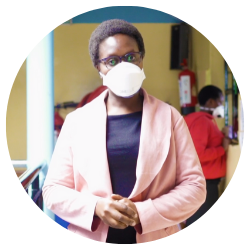
“Many people in Kibera were hesitant to accept vaccinations or medications on fear of the fallacy that they will cause harm,” Eddah said. “Some refused to visit healthcare facilities because they believed that they would contract certain diseases; others relied on traditional healers and in traditional methods of care. Low literacy levels in the community made it difficult to provide this group with accurate information.”
In 2018, Eddah joined CFK as a full-time staff member, responsible for the coordination of activities across CFK’s four health clinics: the Tabitha Medical Clinic, Tabitha Maternity Center, Lishe Bora Nutrition Center, and Young Health and Wellness Center. Eddah also manages CFK’s Community Health Outreach Program.
Tabitha Medical Clinic alone serves between 150 and 250 patients each day for services ranging from immunization to TB care. The Tabitha Maternity Center provides antenatal care, comprehensive maternity care with delivery services, treatment for HIV+ mothers, and support for immunization and care for children under five. The Nutrition Center rehabilitates children with severe malnutrition while the Young Health and Wellness Center offers sexual and reproductive health programs, recreation and education activities, and counseling.
The Community Health Outreach Program recruits and trains Community Health Volunteers (CHVs) to engage with community members and connect them to CFK healthcare services. Eddah believes in the power of CHVs and hopes to transform them into “champions” for health behavior change in the community.
A Passion for Personalized Care
“What makes CFK unique is its focus on members of the community and its holistic approach for providing health care and wellbeing,” Eddah said. “When we connect with people in the community, we’re thinking about how we can serve them regardless of their age or the phase of life that they are in. When I meet a family, I’m thinking about how we can ensure that their newborn baby is well-nourished. When that child begins to grow, I think about connecting them to scholarship opportunities and programs at the Young Health and Wellness Center. And for the mothers, I know that we can provide them with pre-natal care and safe delivery at our Tabitha Maternity Home.”
Working across four different clinics comes with challenges, but Eddah has learned how to manage diverse groups and implement successful programs through individualized approaches.
“I have learned to constantly learn and adapt on the job,” Eddah said. “Strategic thinking is one of the most important skills that I have developed over the last few years.”
When she first started working with CFK, Eddah remembers one particular child that was undergoing treatment for severe acute malnutrition and was in and out of the nutrition program for more than a year. Instead of continuing to use the same resources and strategies, Eddah and her team interviewed the child’s family members to establish a better understanding of the situation. They then developed a personalized structure for monitoring the child from home. After three months, the child was able to enroll in school and has not needed additional treatment from the Center.
“Seeing change come alive in members of the community that we serve is the most fulfilling part of my job,” Eddah said.
Though much of Eddah’s work now focuses on responding to the needs and challenges exacerbated by the COVID-19 pandemic, she hopes to expand CFK’s services in the future.
“I am excited about moving our success stories and community health outreach program to all of the villages in Kibera and areas outside of Kibera,” she said. “I would especially like to replicate the nutrition program to impact more lives. We have been planning for expansion at CFK, and I believe that we are finally ready.”
Learn more about how our primary healthcare facilities are responding to the COVID-19 pandemic.
Stories of Progress
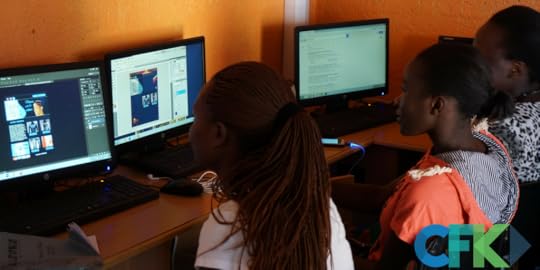 Board Highlight: Thinking Beyond Education to Empower Communitiesby Hannah Bain
Board Highlight: Thinking Beyond Education to Empower Communitiesby Hannah Bain
 CFK Healthcare Staff Featured as Frontline Heroesby Hannah Bain
CFK Healthcare Staff Featured as Frontline Heroesby Hannah Bain
 COVID-19 Response: Healthcare Facilitiesby Hannah Bain
COVID-19 Response: Healthcare Facilitiesby Hannah BainThe post Staff Highlight: Improving Healthcare & Serving Humanity appeared first on Carolina for Kibera.
Improving Healthcare: The Story of Eddah Ogogo
Eddah Ogogo has always had a “passion for serving humanity.” That passion drew her to the Kibera community in 2012, where she volunteered at Carolina for Kibera’s (CFK) Tabitha Medical Clinic for nine months. During that time, she realized that myths and misconceptions surrounding health care were two of the most significant barriers to improving health within the community. With the onset of the COVID-19 pandemic, misinformation, coupled with myths and misconceptions, has created additional challenges to front-line healthcare workers.

“Many people in Kibera were hesitant to accept vaccinations or medications on fear of the fallacy that they will cause harm,” Eddah said. “Some refused to visit healthcare facilities because they believed that they would contract certain diseases; others relied on traditional healers and in traditional methods of care. Low literacy levels in the community made it difficult to provide this group with accurate information.”
In 2018, Eddah joined CFK as a full-time staff member, responsible for the coordination of activities across CFK’s four health clinics: the Tabitha Medical Clinic, Tabitha Maternity Center, Lishe Bora Nutrition Center, and Young Health and Wellness Center. Eddah also manages CFK’s Community Health Outreach Program.
Tabitha Medical Clinic alone serves between 150 and 250 patients each day for services ranging from immunization to TB care. The Tabitha Maternity Center provides antenatal care, comprehensive maternity care with delivery services, treatment for HIV+ mothers, and support for immunization and care for children under five. The Nutrition Center rehabilitates children with severe malnutrition while the Young Health and Wellness Center offers sexual and reproductive health programs, recreation and education activities, and counseling.
The Community Health Outreach Program recruits and trains Community Health Volunteers (CHVs) to engage with community members and connect them to CFK healthcare services. Eddah believes in the power of CHVs and hopes to transform them into “champions” for health behavior change in the community.
A Passion for Personalized Care
“What makes CFK unique is its focus on members of the community and its holistic approach for providing health care and wellbeing,” Eddah said. “When we connect with people in the community, we’re thinking about how we can serve them regardless of their age or the phase of life that they are in. When I meet a family, I’m thinking about how we can ensure that their newborn baby is well-nourished. When that child begins to grow, I think about connecting them to scholarship opportunities and programs at the Young Health and Wellness Center. And for the mothers, I know that we can provide them with pre-natal care and safe delivery at our Tabitha Maternity Home.”
Working across four different clinics comes with challenges, but Eddah has learned how to manage diverse groups and implement successful programs through individualized approaches.
“I have learned to constantly learn and adapt on the job,” Eddah said. “Strategic thinking is one of the most important skills that I have developed over the last few years.”
When she first started working with CFK, Eddah remembers one particular child that was undergoing treatment for severe acute malnutrition and was in and out of the nutrition program for more than a year. Instead of continuing to use the same resources and strategies, Eddah and her team interviewed the child’s family members to establish a better understanding of the situation. They then developed a personalized structure for monitoring the child from home. After three months, the child was able to enroll in school and has not needed additional treatment from the Center.
“Seeing change come alive in members of the community that we serve is the most fulfilling part of my job,” Eddah said.
Though much of Eddah’s work now focuses on responding to the needs and challenges exacerbated by the COVID-19 pandemic, she hopes to expand CFK’s services in the future.
“I am excited about moving our success stories and community health outreach program to all of the villages in Kibera and areas outside of Kibera,” she said. “I would especially like to replicate the nutrition program to impact more lives. We have been planning for expansion at CFK, and I believe that we are finally ready.”
Learn more about how our primary healthcare facilities are responding to the COVID-19 pandemic.
Stories of Progress
 Improving Healthcare: The Story of Eddah Ogogoby Hannah Bain
Improving Healthcare: The Story of Eddah Ogogoby Hannah Bain
 Transforming Education: The Story of Jeffrey Okoroby Hannah Bain
Transforming Education: The Story of Jeffrey Okoroby Hannah Bain
 Summer 2020 Fellows & Interns Tackle Projects Remotely This Summerby Katrina KuliK
Summer 2020 Fellows & Interns Tackle Projects Remotely This Summerby Katrina KuliKThe post Improving Healthcare: The Story of Eddah Ogogo appeared first on Carolina for Kibera.
Staff Highlight: Transforming Education
Jeffrey Okoro is a model for how education can transform a life. After he lost his father in 1998, he went to live with his uncle in Kibera as his mother was unable to support all of her 11 children by herself. In Kibera, Jeffrey missed school for three years due to his inability to pay school fees, but he didn’t let that stop him. He continued to work hard and eventually earned a scholarship to attend high school.
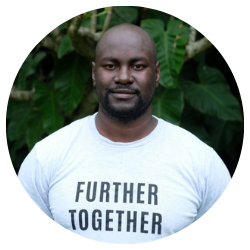
Jeffrey finished high school amid post-election violence in Kibera and began using his passion for and belief in education to address needs in the community alongside Carolina for Kibera (CFK). Growing up in Kibera, he had learned about our organization through our organized local soccer matches.
In 2009, Jeffrey began volunteering as a youth peer provider (YPP) with CFK. In addition to serving as a mentor for children in Kibera, Jeffrey also began documenting their stories through video so they could be shared with a broader audience. When Jeffrey began college, he continued working part-time with us as an administrative assistant. He quickly grew into additional roles, working closely with our interns and volunteers both locally and internationally. He truly embodied our model of participatory development.
“I tried to be a bridge between the local community and the projects [CFK] had,” Jeffrey said.
Transforming Education
Consistently drawn to our education work, Jeffrey became a full-time program officer with our Angaza Scholarship program in 2014. The program supports bright and needy kids with scholarships to attend school while linking them to resources and a network outside of school as well. Though he enjoyed working in that role, Jeffrey realized that something was missing. The scholarships were beneficial to students, but they were not addressing the systemic challenges facing informal schools in the community and around the world.
“It was time to focus on fundamentally changing the outcome of education, not only for a few but for the masses in Kibera, and one way to do that was through research,” Jeffrey said. “To make real change, we need quantifiable, verifiable data, and we need to build a movement that can be easily adopted by locals themselves.”
That movement came in the form of our Best Schools Initiative (BSI), which Jeffrey helped launch in 2017. BSI engages local education professionals to develop and implement data-driven best practices to improve school systems.
“So many kids in Kibera are being left out of learning,” said Jeffrey. “Education for a typical Nairobian is going to a city school that will have its problems but is overall functional. For kids in Kibera, it’s a whole different experience. They go to schools because they are the closest to their houses; they go because the schools are faith-based and they don’t have to pay fees; they go because they have so much baggage that nobody else will take them in.”
BSI currently works with 22 schools and has seen growing interest and support over the last three years, but the program still faces challenges, namely a lack of funding. The initiative works in three main veins: direct provision of education materials and training in Kibera, data collection and program implementation, and expansion of learnings to areas outside of Kibera.
Jeffrey’s passion for education and experience with BSI inspired him to apply for the Metis Fellowship, which engages local leaders to improve education in Nairobi. During his time as a 2019 Metis Fellow, he focused on school improvements in informal settlements and continued to develop BSI.
Securing more sustainable funding would allow Jeffrey and others working within BSI to research and implement best practices in more schools. Additionally, it would allow the group to invest in a digital monitoring system for school attendance to track and quantify progress.
Along with its normal operations, BSI has also quickly responded to the COVID-19 pandemic and the closure of schools, which are “safe spaces” for students in Kibera. The initiative provided a platform for community members and teachers to come together, share ideas, and develop packages to keep students in Kibera learning, engaged, and busy while schools are closed. The team is currently working on delivering 2,000 education packages while continuing to provide information about water, sanitation, and hygiene (WASH).
“I am not attributing this just to education, but the data that we have from the education program shows that the standard and quality of life gradually increases as the community becomes more educated,” said Jeffrey. “Often when we say education, people think solely academic, but education is also about daily life. If anything is going to change someone’s life, it’s education.”
Learn more about how we’re supporting youth in Kibera.
Stories of Progress
 Board Highlight: Thinking Beyond Education to Empower Communitiesby Hannah Bain
Board Highlight: Thinking Beyond Education to Empower Communitiesby Hannah Bain
 CFK Healthcare Staff Featured as Frontline Heroesby Hannah Bain
CFK Healthcare Staff Featured as Frontline Heroesby Hannah Bain
 COVID-19 Response: Healthcare Facilitiesby Hannah Bain
COVID-19 Response: Healthcare Facilitiesby Hannah BainThe post Staff Highlight: Transforming Education appeared first on Carolina for Kibera.
Transforming Education: The Story of Jeffrey Okoro
Jeffrey Okoro is a model for how education can transform a life. After he lost his father in 1998, he went to live with his uncle in Kibera as his mother was unable to support all of her 11 children by herself. In Kibera, Jeffrey missed school for three years due to his inability to pay school fees, but he didn’t let that stop him. He continued to work hard and eventually earned a scholarship to attend high school.

Jeffrey finished high school amid post-election violence in Kibera and began using his passion for and belief in education to address needs in the community alongside Carolina for Kibera (CFK). Growing up in Kibera, he had learned about our organization through our organized local soccer matches.
In 2009, Jeffrey began volunteering as a youth peer provider (YPP) with CFK. In addition to serving as a mentor for children in Kibera, Jeffrey also began documenting their stories through video so they could be shared with a broader audience. When Jeffrey began college, he continued working part-time with us as an administrative assistant. He quickly grew into additional roles, working closely with our interns and volunteers both locally and internationally. He truly embodied our model of participatory development.
“I tried to be a bridge between the local community and the projects [CFK] had,” Jeffrey said.
Transforming Education
Consistently drawn to our education work, Jeffrey became a full-time program officer with our Angaza Scholarship program in 2014. The program supports bright and needy kids with scholarships to attend school while linking them to resources and a network outside of school as well. Though he enjoyed working in that role, Jeffrey realized that something was missing. The scholarships were beneficial to students, but they were not addressing the systemic challenges facing informal schools in the community and around the world.
“It was time to focus on fundamentally changing the outcome of education, not only for a few but for the masses in Kibera, and one way to do that was through research,” Jeffrey said. “To make real change, we need quantifiable, verifiable data, and we need to build a movement that can be easily adopted by locals themselves.”
That movement came in the form of our Best Schools Initiative (BSI), which Jeffrey helped launch in 2017. BSI engages local education professionals to develop and implement data-driven best practices to improve school systems.
“So many kids in Kibera are being left out of learning,” said Jeffrey. “Education for a typical Nairobian is going to a city school that will have its problems but is overall functional. For kids in Kibera, it’s a whole different experience. They go to schools because they are the closest to their houses; they go because the schools are faith-based and they don’t have to pay fees; they go because they have so much baggage that nobody else will take them in.”
BSI currently works with 22 schools and has seen growing interest and support over the last three years, but the program still faces challenges, namely a lack of funding. The initiative works in three main veins: direct provision of education materials and training in Kibera, data collection and program implementation, and expansion of learnings to areas outside of Kibera.
Jeffrey’s passion for education and experience with BSI inspired him to apply for the Metis Fellowship, which engages local leaders to improve education in Nairobi. During his time as a 2019 Metis Fellow, he focused on school improvements in informal settlements and continued to develop BSI.
Securing more sustainable funding would allow Jeffrey and others working within BSI to research and implement best practices in more schools. Additionally, it would allow the group to invest in a digital monitoring system for school attendance to track and quantify progress.
Along with its normal operations, BSI has also quickly responded to the COVID-19 pandemic and the closure of schools, which are “safe spaces” for students in Kibera. The initiative provided a platform for community members and teachers to come together, share ideas, and develop packages to keep students in Kibera learning, engaged, and busy while schools are closed. The team is currently working on delivering 2,000 education packages while continuing to provide information about water, sanitation, and hygiene (WASH).
“I am not attributing this just to education, but the data that we have from the education program shows that the standard and quality of life gradually increases as the community becomes more educated,” said Jeffrey. “Often when we say education, people think solely academic, but education is also about daily life. If anything is going to change someone’s life, it’s education.”
Learn more about how we’re supporting youth in Kibera.
Stories of Progress
 Improving Healthcare: The Story of Eddah Ogogoby Hannah Bain
Improving Healthcare: The Story of Eddah Ogogoby Hannah Bain
 Transforming Education: The Story of Jeffrey Okoroby Hannah Bain
Transforming Education: The Story of Jeffrey Okoroby Hannah Bain
 Summer 2020 Fellows & Interns Tackle Projects Remotely This Summerby Katrina KuliK
Summer 2020 Fellows & Interns Tackle Projects Remotely This Summerby Katrina KuliKThe post Transforming Education: The Story of Jeffrey Okoro appeared first on Carolina for Kibera.
July 2, 2020
Summer 2020 Fellows & Interns Tackle Projects Remotely This Summer

Each summer, CFK engages students, recent graduates, and volunteers from various universities in Kenya–led research and community development projects. Students learn first-hand how our programs are developed and administered, and they experience the impact of the work within the Kibera community. Unfortunately, COVID-19 has taken away the opportunity for travel. However, no virus can stop our group of committed, enthusiastic, and eager public service advocates. This summer, despite the virus, CFK is engaging with young researchers in a remote capacity.
We are thankful that some of our summer team visited Kibera prior to their engagement with CFK and that the others have jumped in eager to help, hoping that one day they will be able to engage experientially on the ground in Kenya. The team is full of talent and eager to both share their skills with and learn from CFK staff to make a difference in Kibera.
Each member of our summer staff brings a unique perspective and expertise to the team. Projects include working on an evaluation impact report of CFK’s 2017-2020 Strategic plan, communication material development to help mitigate COVID-19 in Kibera, collaborations, and partnerships with donors and foundations and educational research on interventions in informal schools in Kenya.
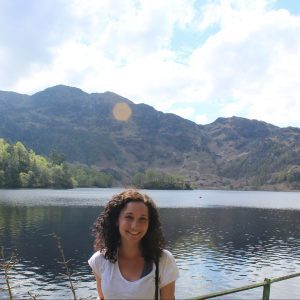
Hannah Bain
Hannah Bain obtained Bachelor’s degrees in Communications, Spanish, and International Studies from North Carolina State University. Hannah has studied in Peru and Spain. She joins the CFK team as a Communication Fellow and will focus on increasing collaboration with current partners, fundraising, grant writing, and media engagement. Quarantine Saving Grace: I got an Australian Shepherd/Poodle mix puppy named Bowen. (Picture included because who doesn’t love a good puppy pic!) He keeps me company while I work, gets me out of the house for at least seven walks per day, and chews on everything in sight (except for his chew toys).
Quarantine Saving Grace: I got an Australian Shepherd/Poodle mix puppy named Bowen. (Picture included because who doesn’t love a good puppy pic!) He keeps me company while I work, gets me out of the house for at least seven walks per day, and chews on everything in sight (except for his chew toys).
Happiest Memory: A family trip to Rocky Mountain National Park. We were most excited about completing the Sky Pond trail. It is a rigorous, nine-mile hike that goes past three large ponds, requires you to scale a waterfall, and reaches an elevation of 10,900 feet. After scrambling up the waterfall, which was running heavily due to recent rain, we reached the end of the trail and enjoyed a lunch of squashed peanut butter sandwiches and bananas with the most amazing view.
Fun Fact: My first job was working as one of the characters along a haunted trail.
Would you rather give up sweets or salts? Salts 100%, I don’t know what I would do without 2 squares of dark chocolate at the end of each day.
What global issue are you most eager to tackle? Expanding access to education and empowerment to decrease preventable diseases and improve global health and health equity.
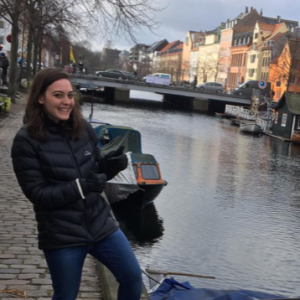
Kathleen Hoffkins
Kathleen Hoffkins is an undergraduate student at American University pursuing a degree in Political Science and International Relations. Kathleen is excited to promote social justice. She joins our team as an intern this summer and will focus on researching evidence-based programs utilized by other organizations and conducting a cost-benefit analysis to help determine if these programs should be considered for implementation by CFK.
Quarantine Saving Grace: Watching Jane the Virgin on Netflix and eating far too much ice cream.
Happiest memory: I love acting. Last year at a dress rehearsal the whole cast was extremely focused and in character, by the end, we felt like we could fly.
Fun Fact: My great grandfather was the person who came up with the idea of putting zippers on pants.
Would you rather permanently give up sweets or salts? Salts because I love chocolate.
What global issue are you most eager to tackle? Rights of refugees.
Katrina Kulik
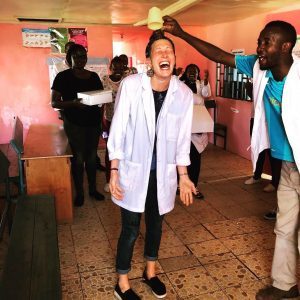
Katrina Kulik obtained a Masters in Humanitarian Health from Johns Hopkins University. Katrina has previously volunteered in South Africa, Guatemala, and Kibera. She is excited to work to improve the lives of people around the world. Katrina joins the CFK team as a Non-Profit Administration Fellow who will be assisting with fundraising, donor engagement, research, and CFK alumni engagement.
Quarantine Saving Grace: Working out & starting a North Carolina County Seat Challenge.
Happiest memory: Receiving a traditional Kenyan birthday washing while in Kibera in 2019. (Pictured)
Fun Fact: After spending a year volunteering, I was banned from South Africa for 5 years. (It’s a long story and a misunderstanding and has since been resolved, but was super scary in the moment.)
Would you rather permanently give up sweets or salts? Salts.
What global issue are you most eager to tackle? WASH/access to clean water and health inequality.
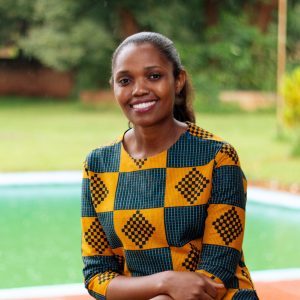
Chimwemwe Kumwenda
Chimwemwe Kumwenda is pursuing a Masters of Public Health in Maternal, Family and Child Health from the University of North Carolina at Chapel Hill (UNC). Sheis from Mangochi, Malawi. She joins our team as an intern and will be assessing Tabitha Maternity Clinic’s preparedness to respond to and manage COVID-19. She will be conducting surveys with health workers, providing recommendations, and publishing a report to communicate her findings.
Quarantine Saving Grace: Baking with my kids. It was a lot of fun despite the mess.
Favorite Memory: When my first baby was placed into my arms right after she was born. It was a moment of pure joy. I felt so much love for her.
Fun Fact: Without sight or smell, an apple, potato, and onion all taste the same. (Although I must say I have never tried it before.)
Would you rather permanently give up sweets or salts? Sweets.
What global issue are you most eager to tackle? Reduction of health disparities (reducing preventable differences between groups in achieving optimal health).
Chelsea Leversedge
Chelsea Leversedge is pursuing a Master’s degree in Public Health with a concentration in global health. She plans to attend 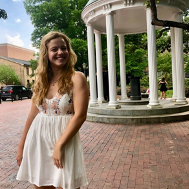 medical school in order to increase access to healthcare for populations domestically and internationally. She joins our team as a UNC Peacock Fellow and will be working on evaluating the 2017-2020 strategic plan with a focus on the impact of maternal health programs. She is also supporting efforts in CFK’s COVID-19 response.
medical school in order to increase access to healthcare for populations domestically and internationally. She joins our team as a UNC Peacock Fellow and will be working on evaluating the 2017-2020 strategic plan with a focus on the impact of maternal health programs. She is also supporting efforts in CFK’s COVID-19 response.
Quarantine Crazy: The craziest thing I did was survive COVID-19.
Favorite Memory: When my sister and I traveled to Germany and Greece last summer, we did everything from hiking to viewing the Berlin wall, cliff jumping, and biking around different cities.
Fun Fact: I was named after a soccer team and I hate coffee and anything coffee-flavored.
Would you rather permanently give up sweets or salts? Sweets.
What global issue are you most eager to tackle? Unequal access to healthcare.
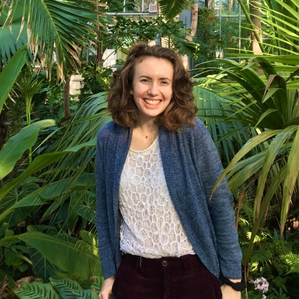
Valerie Lucas
Valerie Lucas is in her final year at UNC majoring in Economics & Global Public Health. Valerie worked as a research analyst for Academic BenchmarkingConsortium and is very involved in the Chapel Hill non-profit community. She volunteers with the Community Empowerment Fund and Durham Volunteer Doulas. She joins our team as a UNC Peacock Fellow and will be working on monitoring and evaluation on the topics of girls’ and women’s empowerment, youth health and engagement, and economic opportunity. Valerie is also working on monitoring and data support for CFK’s COVID-19 response.
Quarantine saving grace: Carpentry. I built, sanded, and stained a TV stand and side table.
Favorite Memory: In 2019, I farmed and worked on various community projects in rural France. I learned so much about growing food and the impact of climate change on small-scale farmers. I met so many wonderful people and cooked some wonderful French meals.
Fun Fact: I usually go by Val but my full name is Valerie Ann Lucas, so my initials are also VAL.
Would you rather permanently give up sweets or salts? Sweets.
What global issue are you most eager to tackle? Global wealth inequality and the impact of colonization and imperialism on low-income countries.
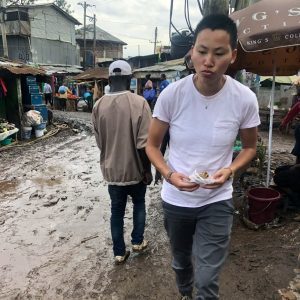
Lia Messinger
Lia Messinger is a senior at American University majoring in Global Health and Environmental Sustainability with a minor in Public Health. In the fallof 2019, Lia spent a month as a CFK community outreach intern in Kibera, working in the maternity ward, pharmacy, and youth empowerment program. This summer she’s working on increasing donor engagement through various platforms such as GlobalGiving and Aid For Africa.
Quarantine Saving Grace: Hiking through DC’s Rock Creek Park.
Happiest memory: Going to China in 2008. I was adopted from Jiangxi as a baby and went back to travel across the country with my family and other girls who were adopted. It felt like I had come home. I could look around and see people that looked like me. Contrary to the U.S., I blended in instead of standing out.
Fun Fact: I am conversational in French and can talk to native speakers.
Would you rather permanently give up sweets or salts? Sweets.
What global issue are you most eager to tackle? Creating better access to healthcare for women and LGBTA persons on a global stage.
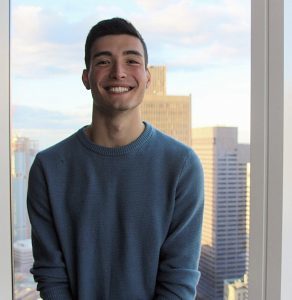
Ben Sorkin
Ben Sorkin is a Harvard University graduate with a degree in Sociology and a minor in Educational Studies. He is joining CFK as a Summer Education Fellow, focusing on education programs, evaluation, and strategic analysis.
Quarantine Saving Grace: Getting outside and running regularly. In April, I completed a 10-mile virtual race.
Happiest memory: Running Harvard’s first-generation and low-income student pre-orientation program. I used my position in student government to advocate for the programs creation and it was so fulfilling to show up to campus my junior year and guide first-years into a new life at Harvard. The newfound confidence these students developed over the course of the three-day orientation was the most fulfilling reward I’ve ever received in my work on campus.
Fun Fact: I traveled to 21 countries before my 21st birthday, my last trip being a crazy 48-hour weekend hop to Iceland with a friend a month before I turned 21.
Would you rather permanently give up sweets or salts? Salts, my sweet tooth is out of control and I could never live without sugar.
What global issue are you most eager to tackle? Access to education and opportunity.
The post Summer 2020 Fellows & Interns Tackle Projects Remotely This Summer appeared first on Carolina for Kibera.
Summer 2020 Fellows & Interns

Each summer, CFK engages students, recent graduates, and volunteers from various universities in Kenya–led research and community development projects. Students learn first-hand how our programs are developed and administered, and they experience the impact of the work within the Kibera community. Unfortunately, COVID-19 has taken away the opportunity for travel. However, no virus can stop our group of committed, enthusiastic, and eager public service advocates. This summer, despite the virus, CFK is engaging with young researchers in a remote capacity.
We are thankful that some of our summer team visited Kibera prior to their engagement with CFK and that the others have jumped in eager to help, hoping that one day they will be able to engage experientially on the ground in Kenya. The team is full of talent and eager to both share their skills with and learn from CFK staff to make a difference in Kibera.
Each member of our summer staff brings a unique perspective and expertise to the team. Projects include working on an evaluation impact report of CFK’s 2017-2020 Strategic plan, communication material development to help mitigate COVID-19 in Kibera, collaborations, and partnerships with donors and foundations and educational research on interventions in informal schools in Kenya.

Hannah Bain
Hannah Bain obtained Bachelor’s degrees in Communications, Spanish, and International Studies from North Carolina State University. Hannah has studied in Peru and Spain. She joins the CFK team as a Communication Fellow and will focus on increasing collaboration with current partners, fundraising, grant writing, and media engagement. Quarantine Saving Grace: I got an Australian Shepherd/Poodle mix puppy named Bowen. (Picture included because who doesn’t love a good puppy pic!) He keeps me company while I work, gets me out of the house for at least seven walks per day, and chews on everything in sight (except for his chew toys).
Quarantine Saving Grace: I got an Australian Shepherd/Poodle mix puppy named Bowen. (Picture included because who doesn’t love a good puppy pic!) He keeps me company while I work, gets me out of the house for at least seven walks per day, and chews on everything in sight (except for his chew toys).
Happiest Memory: A family trip to Rocky Mountain National Park. We were most excited about completing the Sky Pond trail. It is a rigorous, nine-mile hike that goes past three large ponds, requires you to scale a waterfall, and reaches an elevation of 10,900 feet. After scrambling up the waterfall, which was running heavily due to recent rain, we reached the end of the trail and enjoyed a lunch of squashed peanut butter sandwiches and bananas with the most amazing view.
Fun Fact: My first job was working as one of the characters along a haunted trail.
Would you rather give up sweets or salts? Salts 100%, I don’t know what I would do without 2 squares of dark chocolate at the end of each day.
What global issue are you most eager to tackle? Expanding access to education and empowerment to decrease preventable diseases and improve global health and health equity.

Kathleen Hoffkins
Kathleen Hoffkins is an undergraduate student at American University pursuing a degree in Political Science and International Relations. Kathleen is excited to promote social justice. She joins our team as an intern this summer and will focus on researching evidence-based programs utilized by other organizations and conducting a cost-benefit analysis to help determine if these programs should be considered for implementation by CFK.
Quarantine Saving Grace: Watching Jane the Virgin on Netflix and eating far too much ice cream.
Happiest memory: I love acting. Last year at a dress rehearsal the whole cast was extremely focused and in character, by the end, we felt like we could fly.
Fun Fact: My great grandfather was the person who came up with the idea of putting zippers on pants.
Would you rather permanently give up sweets or salts? Salts because I love chocolate.
What global issue are you most eager to tackle? Rights of refugees.
Katrina Kulik

Katrina Kulik obtained a Masters in Humanitarian Health from Johns Hopkins University. Katrina has previously volunteered in South Africa, Guatemala, and Kibera. She is excited to work to improve the lives of people around the world. Katrina joins the CFK team as a Non-Profit Administration Fellow who will be assisting with fundraising, donor engagement, research, and CFK alumni engagement.
Quarantine Saving Grace: Working out & starting a North Carolina County Seat Challenge.
Happiest memory: Receiving a traditional Kenyan birthday washing while in Kibera in 2019. (Pictured)
Fun Fact: After spending a year volunteering, I was banned from South Africa for 5 years. (It’s a long story and a misunderstanding and has since been resolved, but was super scary in the moment.)
Would you rather permanently give up sweets or salts? Salts.
What global issue are you most eager to tackle? WASH/access to clean water and health inequality.

Chimwemwe Kumwenda
Chimwemwe Kumwenda is pursuing a Masters of Public Health in Maternal, Family and Child Health from the University of North Carolina at Chapel Hill (UNC). Sheis from Mangochi, Malawi. She joins our team as an intern and will be assessing Tabitha Maternity Clinic’s preparedness to respond to and manage COVID-19. She will be conducting surveys with health workers, providing recommendations, and publishing a report to communicate her findings.
Quarantine Saving Grace: Baking with my kids. It was a lot of fun despite the mess.
Favorite Memory: When my first baby was placed into my arms right after she was born. It was a moment of pure joy. I felt so much love for her.
Fun Fact: Without sight or smell, an apple, potato, and onion all taste the same. (Although I must say I have never tried it before.)
Would you rather permanently give up sweets or salts? Sweets.
What global issue are you most eager to tackle? Reduction of health disparities (reducing preventable differences between groups in achieving optimal health).
Chelsea Leversedge
Chelsea Leversedge is pursuing a Master’s degree in Public Health with a concentration in global health. She plans to attend  medical school in order to increase access to healthcare for populations domestically and internationally. She joins our team as a UNC Peacock Fellow and will be working on evaluating the 2017-2020 strategic plan with a focus on the impact of maternal health programs. She is also supporting efforts in CFK’s COVID-19 response.
medical school in order to increase access to healthcare for populations domestically and internationally. She joins our team as a UNC Peacock Fellow and will be working on evaluating the 2017-2020 strategic plan with a focus on the impact of maternal health programs. She is also supporting efforts in CFK’s COVID-19 response.
Quarantine Crazy: The craziest thing I did was survive COVID-19.
Favorite Memory: When my sister and I traveled to Germany and Greece last summer, we did everything from hiking to viewing the Berlin wall, cliff jumping, and biking around different cities.
Fun Fact: I was named after a soccer team and I hate coffee and anything coffee-flavored.
Would you rather permanently give up sweets or salts? Sweets.
What global issue are you most eager to tackle? Unequal access to healthcare.

Valerie Lucas
Valerie Lucas is in her final year at UNC majoring in Economics & Global Public Health. Valerie worked as a research analyst for Academic BenchmarkingConsortium and is very involved in the Chapel Hill non-profit community. She volunteers with the Community Empowerment Fund and Durham Volunteer Doulas. She joins our team as a UNC Peacock Fellow and will be working on monitoring and evaluation on the topics of girls’ and women’s empowerment, youth health and engagement, and economic opportunity. Valerie is also working on monitoring and data support for CFK’s COVID-19 response.
Quarantine saving grace: Carpentry. I built, sanded, and stained a TV stand and side table.
Favorite Memory: In 2019, I farmed and worked on various community projects in rural France. I learned so much about growing food and the impact of climate change on small-scale farmers. I met so many wonderful people and cooked some wonderful French meals.
Fun Fact: I usually go by Val but my full name is Valerie Ann Lucas, so my initials are also VAL.
Would you rather permanently give up sweets or salts? Sweets.
What global issue are you most eager to tackle? Global wealth inequality and the impact of colonization and imperialism on low-income countries.

Lia Messinger
Lia Messinger is a senior at American University majoring in Global Health and Environmental Sustainability with a minor in Public Health. In the fallof 2019, Lia spent a month as a CFK community outreach intern in Kibera, working in the maternity ward, pharmacy, and youth empowerment program. This summer she’s working on increasing donor engagement through various platforms such as GlobalGiving and Aid For Africa.
Quarantine Saving Grace: Hiking through DC’s Rock Creek Park.
Happiest memory: Going to China in 2008. I was adopted from Jiangxi as a baby and went back to travel across the country with my family and other girls who were adopted. It felt like I had come home. I could look around and see people that looked like me. Contrary to the U.S., I blended in instead of standing out.
Fun Fact: I am conversational in French and can talk to native speakers.
Would you rather permanently give up sweets or salts? Sweets.
What global issue are you most eager to tackle? Creating better access to healthcare for women and LGBTA persons on a global stage.

Ben Sorkin
Ben Sorkin is a Harvard University graduate with a degree in Sociology and a minor in Educational Studies. He is joining CFK as a Summer Education Fellow, focusing on education programs, evaluation, and strategic analysis.
Quarantine Saving Grace: Getting outside and running regularly. In April, I completed a 10-mile virtual race.
Happiest memory: Running Harvard’s first-generation and low-income student pre-orientation program. I used my position in student government to advocate for the programs creation and it was so fulfilling to show up to campus my junior year and guide first-years into a new life at Harvard. The newfound confidence these students developed over the course of the three-day orientation was the most fulfilling reward I’ve ever received in my work on campus.
Fun Fact: I traveled to 21 countries before my 21st birthday, my last trip being a crazy 48-hour weekend hop to Iceland with a friend a month before I turned 21.
Would you rather permanently give up sweets or salts? Salts, my sweet tooth is out of control and I could never live without sugar.
What global issue are you most eager to tackle? Access to education and opportunity.
The post Summer 2020 Fellows & Interns appeared first on Carolina for Kibera.
Rye Barcott's Blog
- Rye Barcott's profile
- 7 followers



